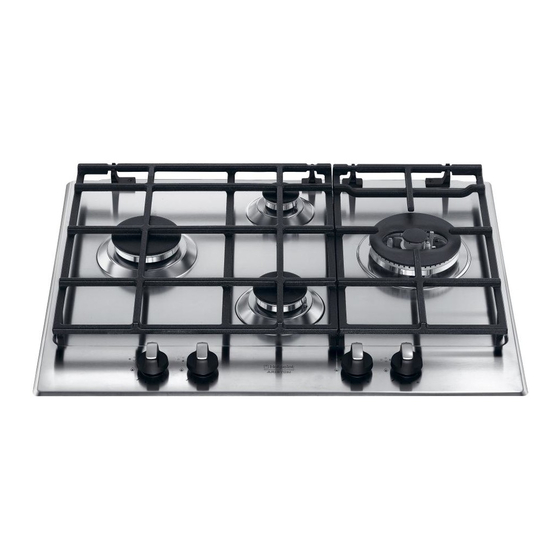Ariston PC 750 TGH AUS Manual de instrucciones - Página 9
Navegue en línea o descargue pdf Manual de instrucciones para Placa Ariston PC 750 TGH AUS. Ariston PC 750 TGH AUS 32 páginas.

indicated and must comply with current electrical regulations
(the earthing wire must not be interrupted by the circuit-
breaker). The supply cable must not come into contact with
surfaces with temperatures higher than 50°C.
! The installer must ensure that the correct electrical
connection has been made and that it is compliant with
safety regulations.
Before connecting to the power supply, make sure that:
• The appliance is earthed and the plug is compliant with
the law.
• The socket can withstand the maximum power of the
appliance, which is indicated on the data plate.
• The voltage is in the range between the values indicated
on the data plate.
• The socket is compatible with the plug of the appliance.
If the socket is incompatible with the plug, ask an
authorised technician to replace it. Do not use extension
cords or multiple sockets.
! Once the appliance has been installed, the power supply
cable and the electrical socket must be easily accessible.
! The cable must not be bent or compressed.
! The cable must be checked regularly and replaced by
authorised technicians only (see Assistance).
! The manufacturer declines any liability should these safety
measures not be observed.
Gas connection
Check The Gas Type
! Before installation, check that the gas type (natural gas
or Universal LPG) of the cooker is suitable for the gas type
available to the installation. It is extremely dangerous to use
the wrong gas type with any appliance, as fire or serious
injury can result.
This cooker is supplied from the factory already set for
Natural Gas. To convert the cooker to LPG (or back to
Natural Gas from LPG), follow the directions later in this
section.
Fit regulator supplied for Natural Gas (if applicable) at rear
of appliance, and as close as practicable to the appliance.
It is recommended that an isolating valve and union be
fitted, to enable simple disconnection for servicing. These
are to be in an accessible location.
! Check that the pressure of the gas supply is consistent
with the values indicated in Table 1 ("Burner and nozzle
specifications"). This will ensure the safe operation and
longevity of your appliance while maintaining efficient
energy consumption.
Pipe or Hose Connection
This appliance is suitable for use with either a flexible
connection or rigid copper connection.
Either a rigid metal pipe with fittings in compliance with the
standards in force must be used for connecting to the nipple
union (threaded ½"G male fitting) situated at the rear of the
appliance to the right (fig.8), or an approved flexible hose
of class B or D.
Should it be necessary to turn the fitting, the gasket
(supplied with the appliance) must be replaced.
If a flexible hose is used, it should be as short as possible
with a maximum length of 1.2 metres;
• The flexible connection must be approved to class B or
D of AS/NZS1869 as a minimum.
• it should not be bent, kinked or compressed;
• it should not be in contact with the rear wall of the
appliance or in any case with parts which may reach a
temperature of 50°C;
• it should not come into contact with pointed parts or sharp
corners;
• it should not be subject to any pulling or twisting forces;
• it should be easy to inspect along its entire length in order
to be able to check its condition.
• The supply connection point must be accessible with the
appliance installed.
• The inner diameters of the pipe are as follows:
8 mm for LPG;
13 mm for Natural Gas.
Checking the tightness of the connection
Upon completion of installation, check the gas circuit, the
internal connections and the taps for leaks using a soapy
solution (never a flame). Also check that the connecting pipe
cannot come into contact with moving parts which could
damage or crush it. Make sure that the natural gas pipe is
adequate for a sufficient supply to the appliance when all
the burners are lit
Duplicate Data Plate
Where the data plate is obscured by cabinetry when the
cooker is in the installed position, place a duplicate data
plate on a surface of the cabinetry adjacent to the cooker.
Adapting to different types of gas
To adapt the hob to a different type of gas other than default
type (indicated on the rating plate at the base of the hob or
on the packaging), the burner nozzles should be replaced
as follows:
1. Remove the hob grids and slide the burners off their
seats.
2. Unscrew the nozzles using a 7 mm socket spanner, and
replace them with nozzles for the new type of gas (see
table 1 "Burner and nozzle characteristics").
3. Reassemble the parts following the above procedure in
the reverse order.
4. Once this procedure is finished, replace the old rating
sticker with one indicating the new type of gas used.
Sticker are available from any of our Service Centres.
Replacing the nozzles on separate "double flame "
burners
1. Remove the grids and slide the burners from their
housings. The burner consists of 2 separate parts (see
figure);
2. Unscrew the burers with a 7 mm wrench spanner. The
internal burner has a nozzle, the external burner has
two (of the same size). Replace the nozzle with models
suited to the new type of gas (see table 1).
3. Replace all the components by repeating the steps in
reverse order.
AUS
9
